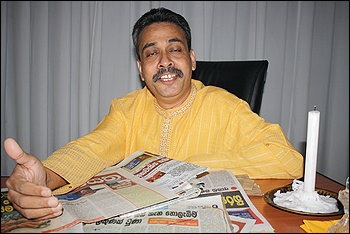 With candles glowing next to his computer, Chandrasiri Bandara, the nation’s most popular astrologer, looked at his birth chart and predicted that he would soon be assassinated.
With candles glowing next to his computer, Chandrasiri Bandara, the nation’s most popular astrologer, looked at his birth chart and predicted that he would soon be assassinated.
Bandara, 48, fears for his life because of a string of death threats that followed his bold forecast that Sri Lanka’s president, Mahinda Rajapaksa, would be booted from office or killed. Bandara was charged with being a threat to national security and jailed for nine days for his premonition this summer.
Though a judge dismissed the case, his brief arrest is being taken seriously in this South Asian nation, where astrologers are so respected that few people arrange marriages or make business decisions, and elections are rarely held, without their consultation.
"Even astrologers have horoscopes," said Bandara, who has his own Web site and writes a column for an opposition newspaper. "Mine does not show a long life. Until 2012 there is a chance of someone in the government killing me."
Arresting and intimidating political dissidents, from journalists to aid workers, is nothing new in Sri Lanka. That was especially true in May when a final government assault on the separatist Tamil Tigers ended one of the world’s longest-running civil wars.
But the "battle of Bandara and his horror-scope," as the astrologer’s plight is known in the media here, also shows the president’s increasing vulnerability. Sri Lanka could hold presidential and parliamentary elections in April, and the opposition parties recently formed an alliance to oppose Rajapaksa.
Other potentially serious problems are stirring for the president. The man who led the army to victory, Gen. Sarath Fonseka, resigned Thursday amid speculation that he would run for president.
Political experts in Sri Lanka say he had a falling-out with Rajapaksa and his brothers and thinks the president has taken too much credit for the war. He was offered a role in the sports ministry but recently declined. "We should not allow the country to go on the wrong path," Fonseka recently said while visiting a Buddhist temple in Washington. "If this happens, I am ready to correct the path, leaving behind my uniform."
Analysts and ordinary Sri Lankans say that Fonseka is the only credible challenger to Rajapaksa. His Facebook page is filled with messages from Sri Lankans expressing adulation. One person posted a mock-up billboard that resembles Obama campaign literature but shows Fonseka’s face and the slogan "Hope." Sri Lankan presidential spokesman Lucien Rajakarunanayake defended the president and said the Rajapaksa brothers can claim a rare distinction for ending decades of terrorism by military means.
For the past year, Rajapaksa’s popularity has rested squarely on success in the war. He has enjoyed especially broad support in the Sinhalese-dominated south, where many army families sang songs about him being crowned a king for vanquishing the Tigers, who are labeled a terrorist organization by governments around the world, including the United States.
Still, dissent is slowly building. During a street demonstration last week by thousands of Rajapaksa opponents, protesters shouted that the country was heading toward a dictatorship, that the government was growing increasingly corrupt and that the economy was sinking.
Opponents also accuse Rajapaksa of nepotism; two of his brothers occupy top government posts, and critics contend that as many as 300 family members are in the government.
"The war euphoria is over now. We can see clearly we are dealing with an autocratic group of brothers that silence journalists, aid workers, political leaders, even an astrologer," said opposition leader Ranil Wickremesinghe.
At least seven journalists have been killed since 2007, including the still unsolved January murder of Lasantha Wickramatunga. A government critic, Wickramatunga predicted his own death in an editorial called "And Then They Came for Me."
The United States has called for an investigation of possible human rights abuses during the final days of the war by both the Tigers and the government. The European Union is considering withdrawing trade concessions worth tens of millions of dollars to Sri Lankan industries because of the military’s conduct.
Rajakarunanayake, the presidential spokesman, said the crackdown on Bandara, the astrologer, came because Bandara was speaking as an opposition political figure and had also given a motivational speech to opposition leaders. "We have to wonder why an astrologer would say such a thing," Rajakarunanayake said. "In Sri Lanka, astrologers are not just for fun. They play powerful roles in steering outcomes. Saying it can make it so."
Still, advocates for freedom of speech say that it doesn’t matter what the astrologer’s political beliefs are, and that his arrest was unjust.
The threats against Bandara and his arrest have prompted astrologers around the world to send e-mails to Sri Lanka’s president on Bandara’s behalf. The World Wide Parapsychological Association asked all newspapers from Asia to replace their horoscopes for a day with a petition demanding his freedom.
As Bandara’s wife fried rice and fish and his two young daughters listened nearby, he proudly displayed a file of columns in which he had made predictions that came true.
Bandara, a tall man with a baritone voice, strolled through his home and onto his leafy veranda. He said that he is ethnically Sinhalese but that he is against the nationalism and anti-Tamil feelings that were stirred up during the final days of the war.
(For updates you can share with your friends, follow TNN on Facebook and Twitter )
